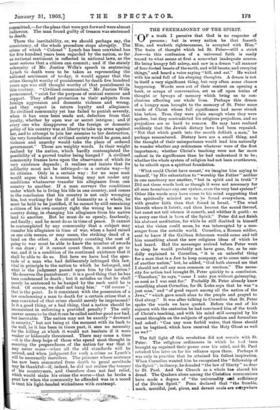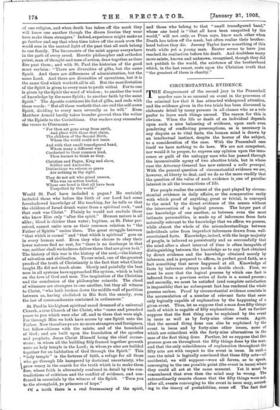THE FREEMASONRY OF THE SPIRIT.
"OF a truth I perceive that God is no respecter of persons ; but in every nation he that feareth Him, and worketh righteousness, is accepted with Him." The train of thought which led St. Peter—still a strict Jew—to this confession of a universal faith is easily traced to what seems at first a somewhat inadequate source. He being hungry fell asleep, and saw in a dream "all manner of four-footed beasts of the earth, and wild beasts, and creeping things," and heard a voice saying "kill, and eat." He waked with his mind full of his sleeping thoughts. A dream is not In itself a very significant thing, but very often some chance happening. 'Words seen out of their context on opening a book, or scraps of conversation, set us off upon trains of thought or byways of memory which bring us to con- clusions affecting our whole lives. Perhaps this dream of a hungry man brought to the memory of St. Peter some words of Christ whose full significance had never struck him before. True, they were plain enough when they were spoken, but they contradicted his religious prejudices, and no prejudices are so hard to remove. He may have realised suddenly that the Jewish dietary laws had been repealed. " Not that which goeth into the mouth defileth a man," he perhaps remembered. Dietary laws are a small thing, and the thought of their unimportance would lead him naturally to wonder whether any ordinances whatever were of the first importance; whether Christ's teaching were not far more radical in its significance than he had understood it to be; whether the whole system of religion had not been overthrown, to be rebuilt upon a spiritual foundation.
'What could Christ have meant,' we imagine him saying to himself, by-His exhortation to "worship the Father" neither in one sanctuary nor another, "but in spirit and in truth" ? Did not these words look as though it were not necessary for all men to embrace any one system, even the very best system £' Other like words may have come to his mind suggesting that the spiritually minded are to be found everywhere, men with greater faith than that found in Israel. "The wind bloweth where it listeth, and thou hearest the sound thereof, but canst not tell whence it cometh, and whither it goeth : so is every one that is born of the Spirit." Peter did not finish his abstract meditation, for while he still doubted in himself what the vision could mean, he was interrupted by a. mes- senger from the outside world. Cornelius, a Roman soldier, sent to know if the Galilean fisherman would come and tell him something about the new religious ideas of which he had heard. Had the messenger arrived before Peter went to sleep he would probably not have gone, for, as he can- didly explained to Cornelius, "it is an unlawful thing for a man that is a Jew to keep company, or to come unto one. of another nation," but, he added, "God bath shewed me that I should not call any man common or unclean." The neces- sity for action had brought St. Peter quickly to a conclusion. "Therefore," he says, "came' I unto you without gainsaying, as sooll as I was sent for." Probably St. Peter already knew something about Cornelius, for St. Luke says that he was " a just man," and "of good report among all the nation of the Jews," "which gave much alms to the people and prayed to God alway." It was after talking to Cornelius that St. Peter spokeS the words we have quoted. Before the end of his sojourn with the centurion he had convinced him of the truth of Christ's teaching, and with his mind still occupied by his recent thoughts on the subjects of spiritualism and formalism had asked : "Can any man forbid water, that these should not be baptised, which have received the Holy Ghost as well as we ? "
The full light of this revelation did not remain with St. Peter. The religions ordinances in which he had been brought up regained their power over his mind, and St. Paul rebuked Lim later on for his reliance upon them. Perhaps it was only hi practice that he attained his fullest inspiration. When Cornelius wanted him he recognised the "fellowship of the Spirit"; in theory, he dreaded "the law of liberty" so dear to" St. Paul. ' And the Church as a whole has shared his dread. The Quakers alone among the Christian conimunions hive made a dogma of "the universality and suffieiency of the Divine Spirit." Penn declared that "the' humble, meek, merciful, just, pious, and devout souls are evEtrywhere
of one religion, and when death has taken off the mask they will know one another though the divers liveries they wear here make them strangers." Indeed, experience might make us go further and say that when time takes off the mask even the world sees in the neutral light of the past that all such belong to one family. The lineaments of the saint appear everywhere in the garb of every creed. Heretic philosopher and orthodox priest, man of thought and man of action, draw together as time flies past them ; and with St. Paul the historian of the good must exclaim : "There are diversities of gifts, but the same Spirit. And there are differences of administration, but the same Lord- And there are diversities of operations, but it is the same God which worketh all in all. But the manifestation of the Spirit is given to every man to profit withal. For to one is given by the Spirit the word of wisdom ; to another the word of knowledge by the same Spirit; to another faith by the same Spirit." The Apostle continues his list of gifts, and ends with
these words: "But all these worketh that one and the self-same Spirit, dividing to every man severally as he will." Even Matthew Arnold hardly takes broader ground than the writer of the Epistle to the Corinthians. Our readers may remember the verses to Obermann :—
"For thou art gone away from earth,
And place with those dost claim,
The children of the Second Birth, Whom the world could not tame.
And with that small transfigured band, Whom many a different way Conducted to their common land, Thou learnst to think as they.
Christian and Pagan, King and slave, Soldier and Anchorite, Distinctions we esteem so grave Are nothing in thy sight.
They do not ask who pined unseen,
Who was on action hurled, Whose one bond is that all have been
'Unspotted by the world."
Would St. Paul have included a pagan P He certainly included those who before the birth of our Lord had some foreshadowed knowledge of His teaching, for he tells us that the children of Israel drank water from a spiritual rock, "and that rock was Christ." Plainly he would not exclude those who know Him only 'after the spirit." Human nature is all alike; blood is thicker than water; baptism, as St. Peter per- ceived, cannot unite men as their common relation to "the Father of Spirits" unites them. The great struggle between "that which is carnal" and "that which is spiritual" goes on in every human soul. Even they who choose to obey their lower natures find no rest, for "there is no discharge in that war, neither shall wickedness deliver those that are given to it." The history of this war is the history of the soul,—the history of salvation and civilisation. To our mind, one of the greatest proofs of the truth of Christianity is the fact that what Christ taught He did not teach alone. Slowly and painfully the best men in all systems have approached His system, which is built on the love of God and man. The inspiration of the Christian and the conclusion of the philosopher coincide. The cloud of witnesses are strangers to one another, but they all witness to Christ, "who hath broken down the middle wall of partition between us, having abolished in His flesh the enmity, even the law of commandments contained in ordinances."
St. Paul in his highest spiritual mood dreamed of a universal Church, a true Church of the Christ, who "came and preached peace to you which were afar off, and to them that were nigh. For through Him we both have access by one Spirit unto the Father. Now therefore ye are no more strangers and foreigners, but fellow-citizens with the saints, and of the household of God; and are built upon the foundation of the apostles and prophets, Jesus Christ Himself being the chief corner- stone; in whom all the building fitly framed together groweth unto an holy temple in the Lord; in whom ye also are builded together for an habitation of God through the Spirit." This i "holy temple" is the fortress of faith, a refuge for all those \who go through life hampered by doctrinal uncertainty, who grow weary in the search for the truth which is to make them free, whose faith is alternately confused in detail by the con- tradictions of criticism and the conflict of evidence, and con- firmed in essentials by the witness of the Spirit. "Turn you to the stronghold, ye prisoners of hope."
Of a truth there is a real freemasonry of the spirit, and those who belong to that "small transfigured band," whose one bond is "that all have been unspotted by the world," will not only, as Penn says, know each other when Death has taken off the mask, but often realise their brother- hood before they die. Jeremy Taylor knew something of this truth while yet a young man. Baxter seems to have just reached its realisation before his death. And doubtless many more saints, known and unknown, recognised, though they did not publish to the world, the existence of the brotherhood which, in the last resort, rests upon the Christian truth that "the greatest of these is charity."























































 Previous page
Previous page